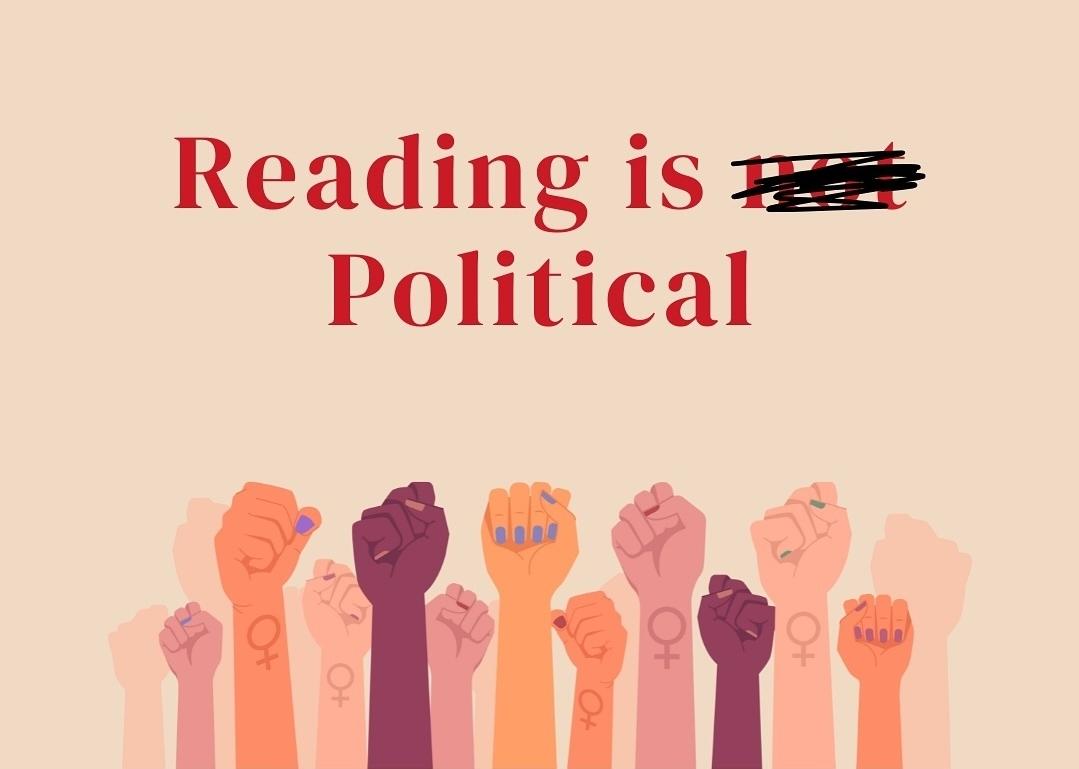In today’s changing world, a new notion has started to take root in a small but very vocal group: the idea that books and politics should not share the same space. In social media, there is a growing trend of readers expressing their desire to escape political conversations by turning to BookTok and Bookstagram.
Statements like “I joined BookTok to get away from politics” or “politics need to stay out of BookTok” have become increasingly common. These comments reflect a rising sentiment that book spaces should be a refuge, a space for escapism from uncomfortable societal issues.
But can books truly exist apart from politics?
The short answer is No.
From their themes to their characters, each book already contains the thoughts and beliefs of the writer. The act of writing itself carries a message that shows reflection, critique, or engagement with the world around us. To suggest otherwise is to deny the very nature of literature.
In fact, even the ability to read is deeply political. Throughout history, literacy has been a tool of both oppression and liberation. Nearly one billion people in the world today cannot read, and for centuries, literacy was deliberately withheld from marginalized communities to maintain power structures. Enslaved individuals in the United States for example were often punished for learning to read because literacy was seen as a path for freedom. Frederick Douglass, who taught himself to read and write, used that skill to fight for his own liberation and to challenge an entire system of oppression. His history is just one example of how reading has long been tied to politics and resistance.
At its core, the debate over politics in books reflects a larger cultural tension between art and activism, between escapism and engagement in societal issues. BookTok, the social phenomenon that has redefined how people discover and discuss literature is at the center of this conversation. While the platform celebrates everything from romance to dystopian fantasies, it has also become a battleground for debates over representation, censorship, and the social responsibility that authors and readers alike share.
Consider classics like George Orwell’s “1984,” a critique of authoritarian regimes. Or Emily St. John Mandel’s “The Glass Hotel,” an exploration of greed and corruption.
Literature has long been an important tool for challenging societal norms and amplifying marginalized voices. To engage with books is to engage with the ideas they present, and often, those ideas are deeply political.
(Discover books that have been challenged: PEN America’s Index of School Book Bans)
This is not to say that every book has to serve as a manifesto. Literature’s beauty lies in its diverse purpose, to educate or provoke, while others give comfort. However, dismissing political discourse in books risks marginalizing authors and stories that dare to challenge the status quo. It also denies readers the opportunity to engage with perspectives that may have broadened their understanding of the world that we live in today.
The push of “keep politics out of books” also raises questions about privilege and perspective. For many readers, particularly those from communities who have been marginalized, the personal is inherently political. Stories that reflect their lived experiences are not political by choice but by necessity. Demanding apolitical discourse translates to wanting literature that centers around privileged, uncontroversial narratives.
The act of choosing what to read and recommend is itself political. Highlighting certain voices while others are ignored shapes the literature landscape and determines which stories get told. When readers refuse to engage with politics in books, they risk reinforcing systemic inequalities within publishing. This is why it’s important to embrace political conversations in literacy spaces, not as a divisive force but to deepen our understanding of the books that we love.
Instead of resisting political conversations on BookTok or Bookstagram, we should welcome them. These platforms have the potential to be spaces where readers can challenge their perspectives and learn from one another. Books are not just an escape, but they are mirrors and windows, that reflect our current society and let us see into other people’s lives.
So next time you pick up a book or scroll on social media consider this: What is the story really saying? What conversations is it inviting you to ask?


